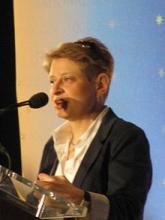Back to the Seventies?
CAMBRIDGE – With the United States’ disastrous exit from Afghanistan, the parallels between the 2020s and the 1970s just keep growing. Has a sustained period of high inflation just become much more likely? Until recently, I would have said the odds were clearly against it. Now, I am not so sure, especially looking ahead a few years.
Many economists seem to view inflation as a purely technocratic problem, and most central bankers would like to believe that. In fact, the roots of sustained inflation mainly stem from political economy problems, and here the long list of similarities between the 1970s and today is unsettling.
At home, following a period in which the US president challenges institutional norms (Richard Nixon was the 1970s version), a thoroughly decent person takes office (back then, Jimmy Carter). Abroad, the US suffers a humiliating defeat at the hands of a much weaker, but much more determined adversary (North Vietnam in the 1970s, the Taliban today).
On the economic front, the global economy suffers a lingering productivity slowdown. According to the Northwestern University economist Robert Gordon’s magisterial account of innovation and growth, The Rise and Fall of American Growth, the 1970s marks a turning point in US economic history, thanks to a sharp slowdown in meaningful economic innovation. Today, even if productivity pessimists grossly underestimate the phenomenal gains the next generation of biotech and artificial intelligence will bring, a large body of work finds that productivity growth has been slowing in the twenty-first century, and now the pandemic looks to be inflicting another heavy blow.
The global economy suffered a massive supply shock in the 1970s, as Middle East countries massively hiked the price of oil they charged the rest of the world. Today, protectionism and a retreat from global supply chains constitutes an equally consequential negative supply shock.
Finally, in the late 1960s and 1970s, huge increases in government spending were not matched by higher taxes on the wealthy. The spending increases stemmed in part from US President Lyndon B. Johnson’s “Great Society” programs in the 1960s, later amplified by the soaring cost of the Vietnam War. First Johnson and then Nixon were reluctant to raise taxes to pay for these costs, fearing a loss of political support. In recent years, first the Trump tax cuts, then pandemic-related catastrophe relief, and now progressive plans to expand the social safety net have hit the federal budget hard. Plans to fund these costs by raising taxes only on the rich will likely fall far short.
It is true that despite all these similarities, today’s independent central banks stand as a bulwark against inflation, ready to raise interest rates if inflation pressures seem to be getting out of hand. In the 1970s, only a few countries had independent central banks, and in the case of the US, it did not act like one, fueling inflation with massive monetary expansion. Today, relatively independent central banks are the norm across much of the world. It is also true that today’s ultra-low global real interest rates provide rich-country governments a lot more room to run deficits than they had in the 1970s.
On the other hand, the challenges of providing for aging populations has become vastly more difficult over the past five decades (at least in advanced economies and China). Underfunded public pension schemes arguably are a much larger threat quantitatively to government budget solvency than debt. At the same time, social pressures to increase government spending and transfers have exploded across the world, as inequality becomes more politically salient for many countries, and improving growth less so. And confronting climate change and other environmental threats will almost certainly put additional pressure on budgets and slow growth.
Sharply rising government debts will inevitably make it more politically painful for central banks to raise nominal interest rates if global real rates start turning upward. High debts are already a reason why some central banks today will hesitate to raise interest rates if and when post-pandemic normalization occurs. Private debt, which has also soared during the pandemic, is perhaps an even bigger problem. Widespread private defaults would eventually have a huge fiscal impact via lower tax collection and higher social safety net costs.
Before we get too pessimistic, let’s remember that the 1970s were followed by the 1980s and 1990s, and a big revival in advanced-economy growth, even if it was not as inclusive as policymakers would like to achieve. Then again, the 2030s are a long way off.
Today’s economic challenges are certainly solvable, and there is no reason why inflation should have to spike. Leading central bankers today such as Jay Powell of the US Federal Reserve and Christine Lagarde of the European Central Bank are a far cry from pliable Fed Chair Arthur Burns in the 1970s. They both have superb staffs to support them. Yet all central banks still face constant pressures, and it is hard for them to stand alone indefinitely, especially if politicians become weak and desperate.
America’s humbling defeat in Afghanistan is a big step toward recreating the perfect storm that led to slow growth and very high inflation of the 1970s. A few weeks ago, a little inflation seemed like a manageable problem. Now, the risks and the stakes are higher.
Kenneth Rogoff, a former chief economist of the International Monetary Fund, is Professor of Economics and Public Policy at Harvard University.
Copyright: Project Syndicate, 2021.
www.project-syndicate.org
This article is brought to you by Project Syndicate that is a not for profit organization.
Project Syndicate brings original, engaging, and thought-provoking commentaries by esteemed leaders and thinkers from around the world to readers everywhere. By offering incisive perspectives on our changing world from those who are shaping its economics, politics, science, and culture, Project Syndicate has created an unrivalled venue for informed public debate. Please see: www.project-syndicate.org.
Should you want to support Project Syndicate you can do it by using the PayPal icon below. Your donation is paid to Project Syndicate in full after PayPal has deducted its transaction fee. Facts & Arts neither receives information about your donation nor a commission.




















